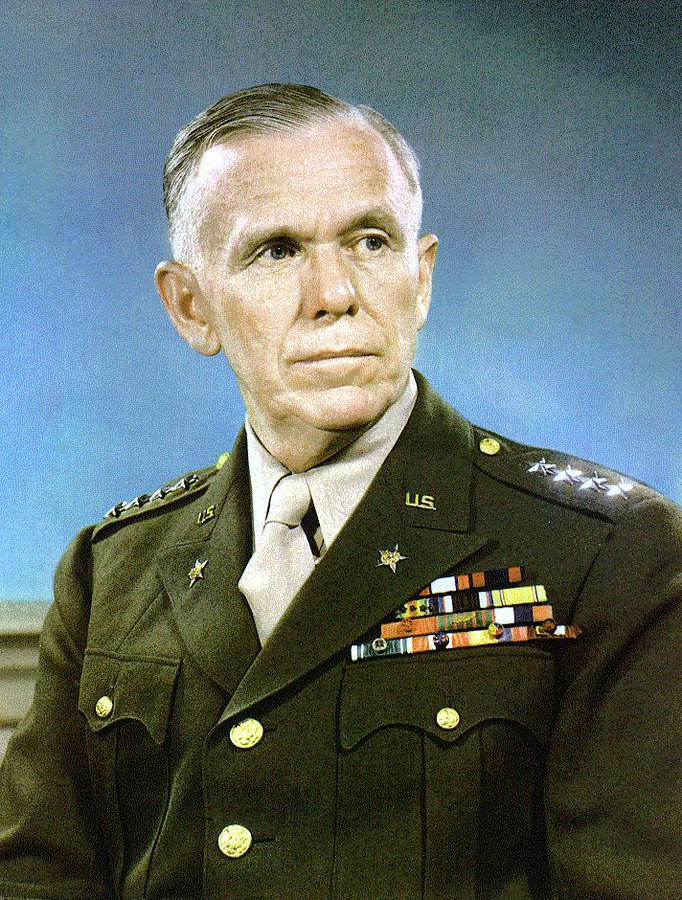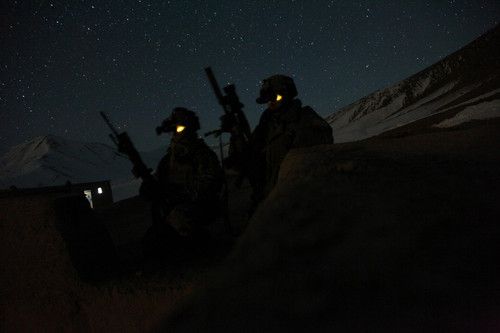March 20, 2024
OP-ED: Purging The "Dead Wood" From The US Military

“The difficulties of leadership which existed in 1917-18 have been enormously multiplied today by the increased mobility and fire power of modern armies, and the necessity for vigorous commanders is greater now than it has ever been before.” - Gen. George C Marshall

(An op-ed: views are 100% my own, and don't reflect any policies or views of any organization.)
General George C Marshall was appointed the 15th Chief of Staff of the U.S. Army on September 1st, 1939 - just a few hours after Hitler launched his invasion of Poland. He assumed command of a 190,000-man force ranked 19th in the world, behind Portugal and ahead of Bulgaria.
A veteran of the Philippines and World War 1, Marshall knew that the U.S. would soon be fighting on foreign shores - and that the Army wasn't ready. He set his sights on the "dead wood" within the force: officers in their fifties and early sixties, many of them superannuated colonels.
At the time, it was possible for an American general to remain in one rank for decades. Inevitably, this led many to become myopic and comfortable in their current world view. Speaking to a promotion review board later, he reiterated his views: “Critical times are upon us,” he warned. Only “today’s performance” mattered. Peacetime achievements were not relevant - he wanted leaders primed for combat.
When the Second Supplemental Appropriation Act of 1940 was passed, one of the provisions included was the "elimination of the seniority-only criteria for promotions". Merit mattered only, going forward. Marshall assembled his "plucking board", whose task was to review the efficiency ratings of the older officers – particularly colonels in their sixties and near retirement who could not withstand the rigors of combat command – weed them out, and promote younger, mentally flexible officers.
The butcher's bill came due shortly after - in the first 6 months, 195 Captains, Majors, Lieutenant Colonels, and Colonels were removed. Over 500 Colonels were ultimately retired - except for a familiar name, George Patton, whose "energy and drive" saved him from the cutting block.
Under Marshall, the force grew to 8,300,000 personnel in uniform - the largest air/ground force in U.S. history. American troops raised during this time fought in every theater, led by Generals and officers whose names are now legendary in military history. Winston Churchill called Marshall the "organizer of victory".
Why does this matter? If the world is on a glidepath to conflict, as it appears to be in many ways, the U.S. needs to seriously consider jettisoning the "dead wood" that fill the ranks, and enforce stricter standards for commissioning young Lieutenants. Serious reform will save lives. Failing to reform will lose wars, and we will continue to produce general officers who lack the morals or intelligence to lead us into conflict.
There is precedence, as we've been down this path before at least twice in the last 100 years. The U.S. military took a brutal look at itself in the shadow of the Vietnam conflict, and pushed significant reforms that ended careers but ultimately led to a stunning victory over Iraq in 1991. The war in Afghanistan, and it's botched withdrawal, are a symptom of a familiar rot. What's the way forward?
To start - fix the ratio of generals to troops. In an op-ed written in 2013, it was noted that in 1945 about 2,000 general and flag officers led a total of about 12 million citizens in uniform. Today, we have about 900 generals and admirals and 1.4 million troops. (http://armedforcesjournal.com/purge-the-generals/)
Reform the promotion process from top to bottom - non-commissioned officers included. The U.S. military needs another Marshall - uninterested in which defense company he or she will work with after they retire, but whose sole purpose is preparing our officers and NCOs for conflict by ensuring only the best of the best receive promotions.
Hold our officers accountable for their failures. Fire those that break the law, violate UCMJ, and remove those responsible for 20 years of failure in Afghanistan and elsewhere. The same goes for those who promote our adversaries while degrading our own political leadership.
Remind General officers (via some mandatory monthly online training, perhaps?) and their staff that Soldiers come first. For example - blaming "discipline issues" for Soldiers living with mold in the barracks was and is a ridiculously tone-deaf assertion. This is just a single example - we're all susceptible to gaffes - but each and every gaffe like this contributes to perceptions which bleed into recruiting and retention woes.
Protect legitimate whistleblowers from retaliation within the organization. The fact that a General was afraid of "retaliation" from his or her superiors for raising the issue noted in the recent article here is a massive red flag. How can we tell our brand new recruits that they are safe from retaliation when even our General officers are afraid of it? https://www.military.com/daily-news/2024/03/19/army-general-pressured-assessment-panel-help-career-of-ineffective-officer.html (Note: This story is recent, and some of the accusations may be completely cleared by an investigation.)
Despite the seemingly negative points above, I hope it is in encouraging to know that the U.S. military, in my experience, still has some of the most professional and skilled leaders that I have ever met - anywhere. They embody the absolute best of what our country has to offer the world. We should also be encouraged by two historical examples of reform that led to victory.
While we are extraordinarily lucky to have the best of the best, we risk losing them to retirement or worse if we let the mediocre and average to promote unimpeded. Separate the wheat from the chaff, or we'll find ourselves led mostly by chaff.

DoD Archive: Code Talkers Helped U.S. Win World Wars I and II
This article was originally written by David Vergun, of DoD news. As it has been removed from DoD sources, it is being added here for posterity.
When the topic of military code talkers comes up, many think of the Navajo code talkers of World War II…
"It's like World War 1" - Interview with a Ukrainian Soldier
The 47th Brigade in Ukraine has been involved in some of the fiercest fighting of the Russo-Ukrainian war, and has been relied on countless times to push the initiative and hold the line, when necessary.
I was fortunate to be able to steal 30 minut…


